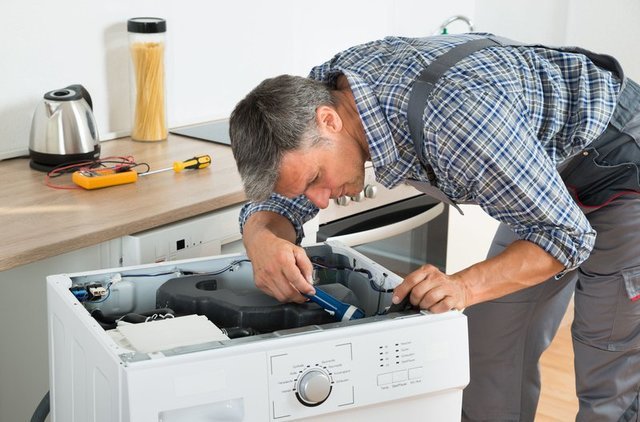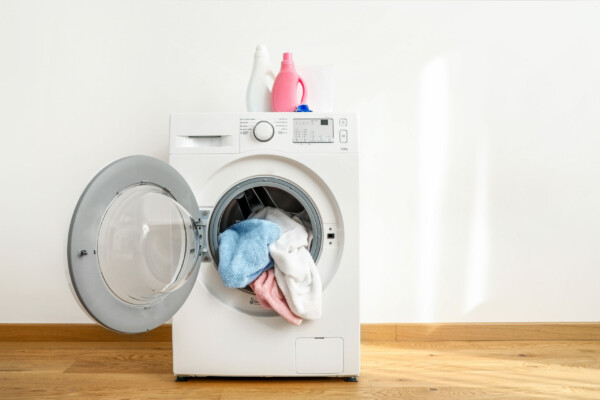8 Reasons Why Your Washing Machine is Grinding
There are many reasons why washing machines make unusual noises during agitation — including a faulty component, poor manufacturing, or a maintenance failure.
Since we primarily focus on why appliances make grinding noises, we trimmed the list of most likely causes to eight possibilities. Let’s take a closer look at them:
Reason 1. The Washer is Operating Normally
In certain cases, a washing machine knocking noise during agitation is a regular occurrence for some manufacturers. It can stem from the agitator changing its rotation directions. For instance, many GE washing machines are known to produce grinding noises upon initiation.
Reason 2. Agitator Dogs are Slipping
The rotating motion of the agitator is permitted by a component called agitator dogs. You can find these in the top part of the agitator in the center column. After frequent use, it’s common for agitator dogs to wear out and start slipping. As a result, you will hear a grinding noise during washing machine agitation.
Reason 3. Drive Pulley Strain or Damage
A worn-out drive pulley is another likely suspect of washing machine grinding. To solve the problem, you need to detach the pulley from the washer and check for signs of wear. If you find glazing, tears or cracks, replacing the equipment is the only way to eliminate the washing machine grinding noise when agitating.
Reason 4. U-joint Failure
U-joint is a central player in washing machine agitation — the mechanism starts the agitation process. Generally, repairing a U-joint on your own is not difficult if you are experienced in do-it-yourself house maintenance.
Replacing the part, on the other hand, is not reasonable as the component is really expensive. If there’s no way to repair the U-joint, consider getting a new washing machine instead.
Reason 5. Stator Assembly Glitch
A malfunction in the stator assembly is another potential cause of the grinding noise during agitation. As this component establishes an electromagnetic connection with the tub, any cracks or error codes may result in agitation failures, manifesting as a loud noise during the washing machine’s agitation cycle.
To troubleshoot and assess the stator, inspect the rotor at the rear of the appliance for any signs of cracks or damage to the magnets.
Reason 6. Motor Control Board Defects
When a washer fails to agitate or produces unusual noises during operation, a technician typically investigates the motor control board. The proper functioning of these components is crucial as they supply the necessary force to start the device and determine the direction of the agitating process.
That’s why you should replace or fix the control board when it gets worn out or unreliable.
Reason 7. Tub Bearing Kit
Agitation problems may arise from tub bearing malfunctions. This type of issue is expensive to deal with — most likely, the grinding noise will not disappear unless you replace both the appliance’s bearing and outer tub.
Reason 8. Motor Coupling Wear
This washing machine component serves as a bridge between the water supply and the motor itself. If the coupling is worn out, it might fail so that it seems like the washer is overfilled with water. In this case, the agitation process will either not work or be slow and noisy.
How to Repair Grinding Noises During Washing Machine Agitation?
Regrettably, in many instances, repairing the specific washing machine component causing agitation noises may not be feasible, and replacement becomes necessary. Nevertheless, the following tips prove valuable in troubleshooting agitation noise issues, potentially restoring the washer’s functionality.
Tip #1. Examine the Motor and Pump
If the grinding noises are traced back to the pump, a stroke of luck may be on your side — often, a thorough cleaning session can resolve the problem. Here’s a step-by-step guide on fixing the pump:
Step 1. Disconnect the washing machine from the electrical source.
Step 2. Detach the front panel, reconnect the washer, and run it (without making contact with the appliance to prevent the risk of an electric shock).
Step 3. Ascertain if there is any agitation noise without the pump. If none is detected, it serves as evidence that a faulty pump is the root cause of the issue.
Step 4. Remove the inlet hose of the pump and see if an impeller is dirty. If so, clean it with a cloth and some vinegar.
Step 5. If there are physical cracks in the pump, get a replacement and install it.
Tip #2. Examine the Shock Absorbers
Checking shock absorbers is another reasonable action when handling washing machine noise during agitation. Unplug the washer and determine the location of the shock absorbers — depending on the model, it will either be a front or a rear panel of the appliance.
Here are the signs that you should replace the shock absorbers of your washing machine:
- They are torn
- They are loose
- They leak fluid
Even if only one of the absorbers is faulty, experienced technicians recommend replacing all absorbers at once to avoid mismatches between the different components.
Tip #3. Assess Drive Motors
By assessing the drive motor, you will be one step closer to figuring out the reason behind the washing machine’s grinding noise during agitation. There are two common drive motor malfunctions:
- The motor itself is malfunctioning;
- The two parts that drive the motor don’t rotate freely and don’t allow smooth agitation.
If it is the former, there’s nothing to do except replace the motor. If the latter is the case, ensure nothing is stuck between the spinning parts, check that the capacitor is not swollen, and ensure all wire connections come together.
Once the motor can rotate freely, you shouldn’t hear the washing machine grinding.
Find Experienced Technicians For Washing Machine Repair at FIX Appliances CA
If you’re looking for a professional team to handle repair services at your home or business in Canada, consider FIX Appliances CA — a team of certified and reliable technicians. Our specialists will inspect your washing machine, determine the cause of the washing machine making a grinding noise during agitation, and fix the problem.
Other than the affordable repair cost, here’s what makes FIX Appliances CA technicians a trusted team for home and business maintenance and repair services:
- We are a certified team. FIX Appliances CA technicians have TSSA certification, proving our proficiency in gas and electric appliance repair.
- Our repairs are warranty-complaint. After fixing a washing machine with FIX Appliances CA, you can still claim a manufacturer’s warranty.
- Top-rated replacement components. By choosing our team, you will benefit from special deals from top-rated house appliance providers — GE, Bosch, LG and others.
- On-going support. After we complete the repair, our support team stays in touch. We will offer you maintenance tips and help troubleshoot repair issues. At FIX Appliances CA, we want to make sure you get the most out of home appliances and are dedicated to educating every homeowner in Canada on how to take better care of household devices.
To contact FIX Appliances CA technicians for washing machines or a dryer making loud noise or other repair help, call us or leave a message. We look forward to hearing from you and helping you get the most out of your appliances.
Date of page creation: April 29, 2020
Page update date: March 19, 2024
What Our Customers Say About Us
Contact Us for Washing Machine Repair Service
TOLL-FREE: 1-888-242-0777
Common Washing Machine Issues
- Washer vibration
- Washer fills slowly
- Washer leaking water
- Washer won’t start
- Washer won’t fill with water
- Washer overflowing
- Washer door or lid won’t lock
- Washer stops mid cycle
- Error code on the electronic panel
- Burning smell from a washer
Same-day Washing Repair Service in Your Area
FIX Appliances CA has branches in different locations. Our technicians are serving the GTA and southern Ontario. Check the map to confirm the service area nearest to your city or town.




